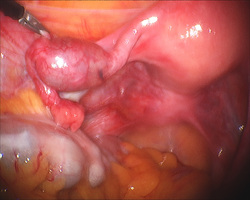
Ectopic pregnancy is a pregnancy that implants itself outside the womb.
The commonest site is the fallopian tube, however ectopic pregnancy can implant in the ovary, in the abdomen, and on the cervix. With the rising number of Caesarean sections it is also possible for ectopic pregnancies to occur in previous caesarean section scars.
What are the symptoms of ectopic pregnancy?
The commonest triad of symptoms is abdominal pain, vaginal bleeding after missing a period.
Symptoms commonly occur at about the 6th week of pregnancy, typically women would have missed a menstrual period.
Missing a period however is not always noticed because of the vaginal bleeding the ectopic pregnancy itself causes. Thus some women may have bleeding because of the ectopic pregnancy and mistake it for a period.
if the pregnancy has ruptured symptoms will include:
- vomiting
- dizzy spells
- fainting spells
- shoulder tip pain
other uncommon and unusual symptoms, diarrhoea
Why ectopic pregnancy is so dangerous?
Pregnancies that implant in the fallopian tubes cannot survive. This is because the fallopian tube is too narrow to accommodate the developing pregnancy. If the pregnancy goes unnoticed it expands the fallopian tube beyond its limit, and the fallopian tube ruptures. If this happens, it is life threatening and on occasion fatal.
Though deaths from Ectopic pregnancy are rare it remains the leading cause of maternal death in early pregnancy.
Most deaths that do occur is as a result of women not knowing they are pregnant and thus there is a delay in presentation and diagnosis. In others though they present in reasonable time, making the diagnosis is delayed.
For these reasons it is important that women are made aware of symptoms and doctors other than gynaecologists are aware of how to make a prompt diagnosis of ectopic pregnancy.
Any woman of childbearing age who is presents with abdominal pain with or without vaginal bleeding should be suspected of having an ectopic pregnancy until proven otherwise.
A brief history and current status
In ancient times and maybe not so long ago, the majority of women who had ectopic pregnancy would not know until the pregnancy ruptured, and they would present with life threatening haemorrhage. Up until the early to mid 1900s 80% of ectopic pregnancies were detected after rupture. More commonly today more 80% are detected before they rupture.
This has been due to advancement in ultrasound and in understanding of the hormone b-HCG (the hormone of pregnancy), and education on the signs and symptoms of ectopic pregnancy
How often does ectopic pregnancy happen?
Ectopic pregnancy as a general rule occurs in 1-2 in 100 pregnancies in the general population. However the true risk will depend on risk factors.








 RSS Feed
RSS Feed